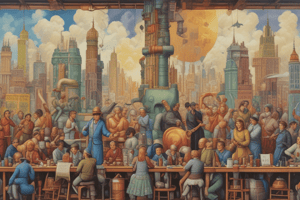Podcast
Questions and Answers
In the context of economics, "scarce resources" refer to goods that are not in sufficient supply to meet everyone's desires.
In the context of economics, "scarce resources" refer to goods that are not in sufficient supply to meet everyone's desires.
True (A)
Normative economics primarily focuses on explaining and predicting economic phenomena.
Normative economics primarily focuses on explaining and predicting economic phenomena.
False (B)
Microeconomics deals with the overall economy, including aggregate production and inflation.
Microeconomics deals with the overall economy, including aggregate production and inflation.
False (B)
The 'First Principle of Economics' states that economic agents choose optimally based on all available information.
The 'First Principle of Economics' states that economic agents choose optimally based on all available information.
Signup and view all the answers
Economic agents, such as consumers, firms, and governments, are always assumed to make choices that maximize their personal utility or profits.
Economic agents, such as consumers, firms, and governments, are always assumed to make choices that maximize their personal utility or profits.
Signup and view all the answers
The statement "The unemployment rate in Spain is 10%" is a normative economic statement.
The statement "The unemployment rate in Spain is 10%" is a normative economic statement.
Signup and view all the answers
The study of the electricity market design is a macroeconomics topic.
The study of the electricity market design is a macroeconomics topic.
Signup and view all the answers
The "adequacy of a public economic program to stimulate the economy" would be considered both a microeconomics and macroeconomics question.
The "adequacy of a public economic program to stimulate the economy" would be considered both a microeconomics and macroeconomics question.
Signup and view all the answers
The opportunity cost of attending an economics course includes the tuition fees and the value of the best alternative use of that time.
The opportunity cost of attending an economics course includes the tuition fees and the value of the best alternative use of that time.
Signup and view all the answers
In a situation with free-riders, the equilibrium is reached when everyone contributes equally to the shared good.
In a situation with free-riders, the equilibrium is reached when everyone contributes equally to the shared good.
Signup and view all the answers
A correlation between crowded beaches and hot temperatures necessarily implies that hot temperatures cause crowded beaches.
A correlation between crowded beaches and hot temperatures necessarily implies that hot temperatures cause crowded beaches.
Signup and view all the answers
A simplified description of reality used to generate predictions is called a hypothesis.
A simplified description of reality used to generate predictions is called a hypothesis.
Signup and view all the answers
The slope of a line represents the y-intercept and the y-intercept represents the slope.
The slope of a line represents the y-intercept and the y-intercept represents the slope.
Signup and view all the answers
Optimization in differences focuses on comparing the total net benefit of each option.
Optimization in differences focuses on comparing the total net benefit of each option.
Signup and view all the answers
The marginal cost represents the total cost of choosing one option over another.
The marginal cost represents the total cost of choosing one option over another.
Signup and view all the answers
In a controlled experiment, the subjects are randomly assigned to treatment and control groups by the researcher.
In a controlled experiment, the subjects are randomly assigned to treatment and control groups by the researcher.
Signup and view all the answers
The opportunity cost of time spent commuting to work includes the value of the time that could have been spent on leisure activities, but not the cost of gasoline.
The opportunity cost of time spent commuting to work includes the value of the time that could have been spent on leisure activities, but not the cost of gasoline.
Signup and view all the answers
The free-rider problem is less severe in a flat with 6 people than in a flat with 2 people because each individual's contribution is smaller in a larger group.
The free-rider problem is less severe in a flat with 6 people than in a flat with 2 people because each individual's contribution is smaller in a larger group.
Signup and view all the answers
The best alternative use of a resource is called its opportunity cost.
The best alternative use of a resource is called its opportunity cost.
Signup and view all the answers
A budget constraint is a condition that forces individuals to make trade-offs when making decisions about spending.
A budget constraint is a condition that forces individuals to make trade-offs when making decisions about spending.
Signup and view all the answers
The scientific method is a process of testing models using data and updating the models based on the results of the tests.
The scientific method is a process of testing models using data and updating the models based on the results of the tests.
Signup and view all the answers
Averages are always more reliable than anecdotes when testing economic models.
Averages are always more reliable than anecdotes when testing economic models.
Signup and view all the answers
When a variable is omitted from an analysis, it cannot impact the correlation between the remaining variables.
When a variable is omitted from an analysis, it cannot impact the correlation between the remaining variables.
Signup and view all the answers
Flashcards
Economics
Economics
The study of how agents make choices with scarce resources.
Economic Agents
Economic Agents
Groups or individuals (like consumers or firms) that make choices.
Scarce Resources
Scarce Resources
Goods not sufficient to satisfy everyone's wants.
Positive Economics
Positive Economics
Signup and view all the flashcards
Normative Economics
Normative Economics
Signup and view all the flashcards
Microeconomics
Microeconomics
Signup and view all the flashcards
Macroeconomics
Macroeconomics
Signup and view all the flashcards
Optimization
Optimization
Signup and view all the flashcards
Trade-offs
Trade-offs
Signup and view all the flashcards
Budget constraint
Budget constraint
Signup and view all the flashcards
Opportunity cost
Opportunity cost
Signup and view all the flashcards
Cost-benefit analysis
Cost-benefit analysis
Signup and view all the flashcards
Equilibrium
Equilibrium
Signup and view all the flashcards
Free-rider problem
Free-rider problem
Signup and view all the flashcards
Empiricism
Empiricism
Signup and view all the flashcards
Causation
Causation
Signup and view all the flashcards
Correlation
Correlation
Signup and view all the flashcards
Positive correlation
Positive correlation
Signup and view all the flashcards
Negative correlation
Negative correlation
Signup and view all the flashcards
Marginal analysis
Marginal analysis
Signup and view all the flashcards
Optimization in levels
Optimization in levels
Signup and view all the flashcards
Marginal cost
Marginal cost
Signup and view all the flashcards
Good economic questions
Good economic questions
Signup and view all the flashcards
Study Notes
Scope of Economics
- Economics examines how agents make choices with limited resources and how these choices impact society.
- The core concept is choice, not wealth or money.
- Economic agents include individuals, households, firms, and governments, who generally make optimal choices.
- Scarce resources are goods or services insufficient to meet everyone's needs.
- Positive economics describes actual economic agent behavior using objective analysis and facts. It avoids value judgments. (e.g., mean wage in sectors, gender income gap determinants)
- Normative economics prescribes what economic agents should do, often leading to policy recommendations. (e.g., best job offer, policies to reduce income gap)
Microeconomics
- Focuses on individual economic agents (households, firms, etc.) and their choices.
- Analyzes how these choices affect prices, resource allocation, and other agents' well-being.
- Examines specific aspects of the economy, not the entire system.
- Includes topics like consumer choice, market design, and firm behavior.
Macroeconomics
- Studies the economy as a whole.
- Examines aggregate production, inflation, economic cycles, labor markets, monetary policy, etc.
- Analyzes the overall performance of a country's economy.
- Includes topics such as the impact of labor reforms on unemployment and GDP or assessing economic stimulation programs.
Principles of Economics
Optimization
- Aims to find the best possible choice given available information.
- Requires considering feasible options, available information, and personal preferences.
- Involves trade-offs, where choosing one option means giving up another.
- Budget constraints limit available choices.
- Opportunity cost is the value of the best alternative use of resources.
- Cost-benefit analysis compares benefits and costs in a common unit.
Equilibrium
- A state where no agent can benefit by changing their behavior.
- Exists in various situations, including queues, markets, and political campaigns.
- Assumes agents make optimal decisions.
Empiricism
- Utilizes data to answer economic questions.
- Separates correlation from causation.
- Correlation describes the relationship between variables (e.g., crowded beaches and high temperatures).
- Causation establishes a direct cause-and-effect relationship.
- Emphasizes the use of data over anecdotes.
Economic Models and Data Analysis
- Models are simplified representations of reality.
- The scientific method includes building models, formulating hypotheses, testing with data, and refining based on outcomes.
- Models are useful simplifications, like a simplified map of a city, but may not precisely reflect complex realities.
- Correlation vs. Causation:
- Omitted variables: Aspects not included in a model that may influence cause-and-effect relationships.
- Reverse causality: Determining cause and effect is complex; factors should be closely examined.
- Experiments: Controlled experiments provide strong evidence for cause and effect.
- Natural experiments: Observe events to identify potential cause-effect.
- Causation vs Correlation: Key differences include omitted variables, reverse causality, and experiments.
Cost-Benefit Analysis and Optimization
- Evaluate costs and benefits in the same unit for optimal decision-making.
- Optimize decisions using total net benefit (benefits – costs), comparing across choices.
- Marginal analysis focuses on changes in costs and benefits between choices.
- Optimization can be limited by factors like: incomplete information, cost of information gathering, lack of expertise, and trade-offs.
Choosing and Commuting
- Reasons for commuting costs: Availability of public transport, fuel costs, parking fees, vehicle maintenance, and time opportunity costs.
Studying That Suits You
Use AI to generate personalized quizzes and flashcards to suit your learning preferences.
Description
This quiz explores the fundamental principles of economics, including the significance of choice, resource allocation, and the roles of various economic agents. It also distinguishes between positive and normative economics and delves into microeconomic analysis. Test your understanding of these essential economic concepts!




